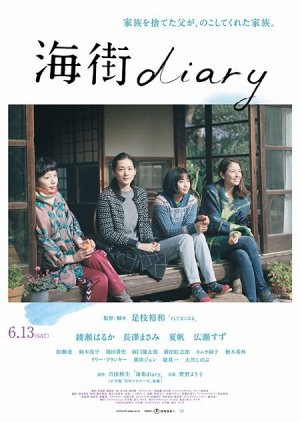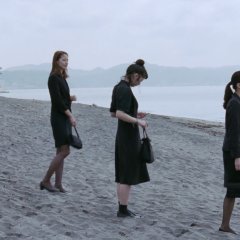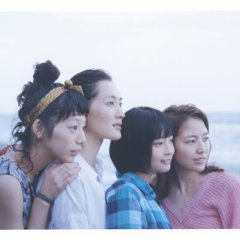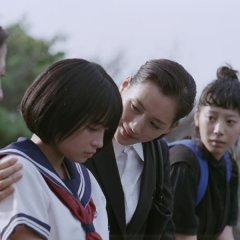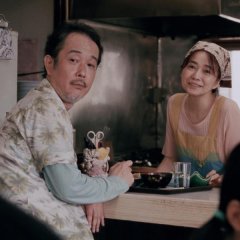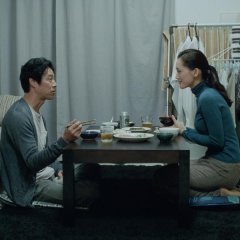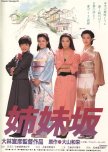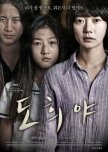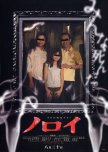 8 Movies To Watch This International Women's Day
8 Movies To Watch This International Women's Day Three Koda sisters, 29-year-old Sachi, 22-year-old Yoshino, and 19-year-old Chika, live at their grandmother's home in Kamakura, Japan. When the Koda sisters were young, their parents divorced, and they were abandoned. Not having seen their father in 15 years, they receive news of his death. Sachi asks her sisters, Yoshino and Chika, to attend the funeral, where they meet 13-year-old Asano Suzu, their half-sister. Yoshino is aware that her father's widow, Yoko, is not Suzu's real mother and finds her to be unfit as a guardian. Concerned for Suzu's well-being, Sachi attends the funeral and invites Suzu to live with them. Suzu gladly accepts. (Source: MyDramaList) ~~ Adapted from the manga series "Umimachi Diary" (海街diary) written and illustrated by Yoshida Akimi (吉田秋生). Edit Translation
- English
- 中文(台灣)
- Türkçe
- Français
- Native Title: 海街diary
- Also Known As: Umimachi Diary , Sea Town Diary , Kamakura Diary
- Screenwriter & Director: Koreeda Hirokazu
- Genres: Life, Drama
Cast & Credits
- Ayase HarukaKoda Sachi [Eldest sister]Main Role
- Nagasawa MasamiKoda Yoshino [Second sister]Main Role
- KahoKoda Chika [Third sister]Main Role
- Hirose SuzuAsano Suzu [Youngest half-sister]Main Role
- Otake ShinobuSasaki Miyako [Mother of Koda sisters]Support Role
- Kiki KirinKikuchi Fumiyo [Great Aunt of Koda sisters]Support Role
Reviews

"Let's live together, the four of us."
If there is both hope and sadness to be found in the human condition, it is to be found in films like ‘Our Little Sister’. Nurtured by Koreeda’s empathetic and sensitive direction, it flourishes into showers of pink cherry blossoms and joyous smiles, evoking such rapturous beauty that you want to stay in the moment for just a little longer. But time moves on- the seasons change, the cherry blossoms fall to the ground and people say their farewells to each other. Through its harmonious balancing of dual aspects: optimism and melancholy, caring and abandonment, life and death, this bittersweet drama embodies the concept of ‘Mono no Aware’ (物の哀れ). There is vibrance and beauty in the existence of life, but it is also fragile, transient- under the watchful gaze of an old mansion and a giant tree, it blooms and fades away in the tiniest span of time. But ‘Our Little Sister’ emphasises- quietly but emphatically- that this is all the more reason to savor it in every moment, be it eating meals with your loved ones, feeling the sun streaming down on your face as you ride through a tunnel of falling petals or looking out at the grey waves after a funeral has passed.Moving away from this concept of ‘Mono no Aware’, Koreeda centres his drama on a fractured family unit and depicts how it heals-slowly- as the missing piece is filled by another. As he always does, he “turns the camera into a window” (to quote Brian Tallerico), capturing both the ups and downs, and the larger joys and tragedies with a masterful lucidity. I’ve already waxed lyrically on Koreeda’s other films so there isn’t much left for me to say as it ticks all of his boxes- damaged families, slow pacing, food scenes, passing trains, etcetera. One interesting thing that I would like to point out is how the composition of the (matriarchal) household has changed in the absence of the father and mother. Sure there are three sisters, but Sachi is ostensibly the mother-stern yet kind- while Yoshino and Chika are like unruly children. When Suzu enters the household, the two middle sisters move up the totem pole, resulting in the youngest sister being doted on as both a child and a little sister. And only when their real mother enters the picture are we reminded that Sachi is, herself, a daughter- even if her childhood was unwrought by the folly of adults. In depicting the shifting of familial roles, as he did in ‘Nobody Knows’, Koreeda provides a testament to the strength and adaptability of children (through three of them have grown up). Trauma may have shattered their lives, but through their shared companionship, they slipped back into the flow of life. Time spent together hardened and solidified the bonds between them, and having confronted and moved on from the past, their scars began to fade away.
The main deviating factor of ‘Our Little Sister’ from Koreeda's filmography is its soundtrack. Foregoing Gontiti's melancholy guitars or Bach's variations, Koreeda instead chooses a lush and sweeping orchestral score by the talented Kanno Yoko- a perfect complement to the scenic coastside setting of Kamakura. It seems not everyone liked this soundtrack, with some reviewers complaining that it is excessively sentimental, syrupy, sickly-sweet, something else with sibilance. However, I think that there is nothing wrong with it due to how this film is (intentionally) more of an audiovisual feast than Koreeda’s others. Similarly, the soundtrack could be accused of broadcasting the intended emotions too ‘obviously’, betraying Koreeda’s tendency towards the implicit and objective. But since the film doesn’t veer into being excessively sentimental or melodramatic, I don’t see a problem with this. In short, the soundtrack is excellent, and it is streaming on spotify and apple music for your listening pleasure.
A large part of this film’s popularity is presumably due to its ensemble cast, all of whom performed excellently. Ayase Haruka and Nagasawa Masami, both mainstream stars, conjured forth their inner talent to give naturalistic, high-caliber acting. Kaho, in a far cry from her darker roles, was great as the goofy Chika- though I still found it hard to erase the memory of her as the blood-soaked vampire warrior K from 'Tokyo Vampire Hotel'. Suzu, then a newcomer, clearly had some measure of uncertainty- but this was perfect for her character, whose wide eyes radiated sincerity and later, well-earned happiness. Other names with considerable mainstream fame- regulars Kirin Kiki, Lily Franky, Kase Ryo, then Suzuki Ryohei, Sakaguchi Kentaro (in a subtle ‘Ore Monogatari’ reunion), Tsutsumi Shin'ichi, Fubuki Jun, Otake Shinobu (the mothers from ‘Soredemo Ikite Yuku’) and so on- also contributed to the vast stirring pot of talent. Another special mention to Oshiro Maeda, then a young lad, who I hope to see in more of Koreeda’s future works.
Compared to his other work, ‘Our Little Sister’ isn’t regarded as strongly by critics. It was apparently disparaged at Cannes and critics have looked down their noses at it, labelling it as “decidedly middle-brow”, “Kore-eda lite”, “frictionless” and worst of all, “boring”. To which I say that they’re just snobbish, pretentious and a bit too jaded. This film isn’t meant to be dark, conflicted, fraught with emotion. It is meant to be a feast for the senses and for the heart- and to that end it succeeds, leaving viewers emotionally satisfied and with just a tinge of wistful sadness. 8.5/10

It's subtle but as with Koreeda, it's nothing new: it's about the little details and the little things. I say that Our Little Sister doesn't come as strong because it's less sentimental and it's less melodramatic. The conflict here is not as jarring as say, Nobody Knows or Like Father Like Son. That's one aspect that makes it seem directionless but if you look at it from another way, maybe that's the intention: not to have such a big conflict (the fact that the sister is another woman's is the central conflict) but to just tell a story. And one that's still touching. As someone who doesn't have a sister (I have two brothers and the middle child), I felt the bonds of sisterhood even just a little.
Koreeda trademarks are still present: music pacing (this time, not much piano), long shots showing the beauty of the setting hence, not much close-up and the little details (e.g. the umerashi). Though this time, we don't have young actors (save for Hirose Suzu who is around 17 years old when she filmed this), but the cast including Haruna Ayase, Kaho, Masami Nagasawa (who was also in I Wish) still delivers incredible performances. All three of them were nominated in Japan Academy Award for their performances.
I actually liked the contrast between the four sisters, Ayase plays the eldest, the mother figure, Nagasawa plays the carefree, stylish one, Kaho plays the oddball, happy-go-lucky and Suzu plays the quiet, simple one. It's such a treat to watch all these different personalities go together and interact. There is undeniable chemistry between the four.
Suzu (who won Breakthrough Star in Japan Academy Award), a current rising young star, whose two TV dramas I've seen, can act but sincerity lacks (like her eyes, it's shallow, it doesn't speak the emotions, you get what I mean? Some call her a deadeye actor but she can cry alright) although here because it's less melodramatic, her character fits her well, comparatively speaking. (But with more roles being given to her currently and working with talented actors, perhaps it's bound to change.)
As with Koreeda, lines are so natural and everything flows so well. The cinematography is so beautiful and the beauty of the countryside has been highlighted in the film. It also competed for Palme d'Or at Cannes 2015 (Suzu at Cannes at 17!!)
Our Little Sister isn't bad, I enjoyed it for its simplicity and beautiful visuals. But perhaps its unsentimental approach makes it a lackluster watch compared to other heavy Koreeda's dramas. Indeed, it doesn't have the feels but it has a calming effect as you watch: the setting helps, and the natural acting helps. It won't break your heart but it will touch your heart.

